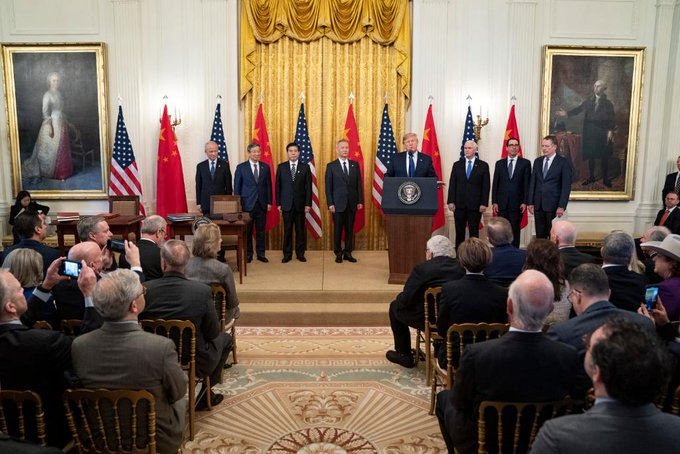The US President Donald Trump and Chinese Vice Premier Liu He signed the Phase I of the trade deal, on Wednesday, January 15, in Washington.
The 86-page deal was signed in the presence of Vice President Mike Pence, several Cabinet members and a number of business tycoons. Trump described the deal as "a momentous step... to a future of fair and reciprocal trade".
What all are covered in Phase I of the deal?

The deal includes Intellectual Property (IP) Protection and Enforcement, ending forced technology transfer, dramatic expansion of American agriculture, removing barriers to American financial services, ending currency manipulation, re-balancing the US-China trade relationship and effective dispute resolution.
China has agreed to buy $200 billion worth of US farm and other products over two years. The Asian country has also agreed to buy $40 billion worth of US farm products, in a year. Till now China has never imported more than $26 billion of farm products in a year.
But tariffs on about $360 billion of Chinese imports are still in place till the second phase of the deal is chalked out. The US has agreed to drop additional tariffs on $160 billion of Chinese imports. Existing tariffs on $110 billion of its products are cut to half, to 7.5 percent.
Writing the wrongs of the past: Trump
In his remarks, Trump described the deal as "writing the wrongs of the past" and said that he will soon visit China, CNN reported. "I'll be going over to China in the not-too-distant future to reciprocate," he said.
Quoting an ancient Chinese quote, Vice President Mike Pence said, "let today be the beginning of a brighter future... more prosperous" for both the American and Chinese people.
Chinese Premier Xi Jinping had sent a letter that was read by Vice Premier Lie He in which he said that he welcomes the Phase 1 trade deal reached with the United States and that he is willing to stay in close touch with the American leader. The deal shows how the two countries can resolve their differences and find solutions based on dialogue, the Chinese leader wrote.
Former Vice President and Democratic front-runner Joe Biden criticized the deal alleging that China is the real winner in this deal. "True to form, Trump is getting precious little in return for the significant pain and uncertainty he has imposed on our economy, farmers, and workers," he said.
"The deal won't actually resolve the real issues at the heart of the dispute, including industrial subsidies, support for state-owned enterprises, cyber-theft, and other predatory practices in trade and technology," Biden said.
Despite criticism, the US President does come out as a winner, who can claim a victory in the form of the trade deal, prior to the 2020 US Presidential elections.








